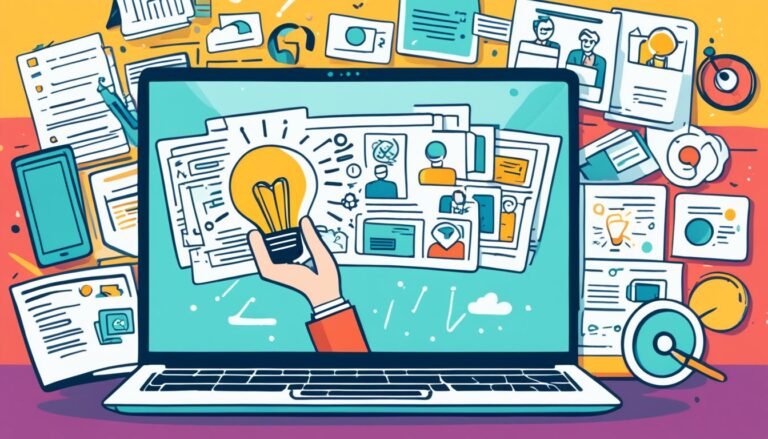Personality and Work-Life Balance: Finding Harmony
Imagine Sarah, a driven marketing executive, juggling client calls and helping her daughter with homework. After hanging up, she feels guilty. She’s not alone in this struggle for work-life balance. Many professionals face similar challenges, with their personality traits playing a big role.
In today’s fast world, finding harmony between work and personal life is a common goal. Yet, for 82% of people, guilt often comes with not balancing work and family well. This isn’t just about managing time; it’s about our personality and values.
In the entrepreneurial world, 67% feel socially isolated due to work. This shows how some personality types might overwork, hurting personal relationships and well-being at work.
Interestingly, 94% believe in work-life harmony over balance. This change in view means finding a rhythm that fits each person, based on their unique traits and life.
Communication and being open are key in finding harmony. 76% say open dialogue is vital for healthy relationships while managing work and family. Also, 45% found sharing work emotions with partners helped find harmony.
Key Takeaways
- Work-life balance challenges are common and often tied to personality traits
- Guilt is a frequent emotion when struggling with work-family responsibilities
- Work-life harmony is preferred over strict balance by most individuals
- Open communication is crucial for maintaining relationships and work-life harmony
- Sharing work-related emotions can help achieve better work-life integration
- Personality types can influence susceptibility to overwork and social isolation
- Recognizing individual differences is key to finding personal work-life harmony
Understanding the Concept of Work-Life Balance
Work-life balance is key to our happiness and well-being. It’s about finding harmony between work and personal life. This ensures we have time for both without sacrificing one for the other.
Defining Work-Life Balance
Work-life balance is about finding a balance between work and personal life. It’s not about spending equal time on both. It’s about feeling fulfilled in both areas. This balance helps us be emotionally intelligent and live a better life.
The Importance of Harmony
Maintaining harmony between work and personal life is vital for many reasons:
- Reduces stress and prevents burnout
- Improves physical and mental health
- Enhances productivity and job satisfaction
- Strengthens personal relationships
Common Misconceptions
Many people have wrong ideas about work-life balance:
| Misconception | Reality |
|---|---|
| Longer hours equal higher productivity | Stanford research shows productivity drops after 50 hours/week |
| Work-life balance is impossible in high-pressure jobs | Balance is achievable with proper strategies and support |
| Balance means equal time for work and personal life | It’s about finding individual harmony, not strict time division |
Understanding these concepts is the first step towards achieving a healthy work-life integration. It improves our overall well-being at work.
The Impact of Personality on Work-Life Integration
Personality types greatly affect how we manage our work and personal lives. Studies show that the Big Five personality traits play a big role in job involvement and work-life balance. A study with 436 working professionals looked at how personality affects work-life balance. It used feedback from employees, family members, and supervisors.
Different personalities handle stress and work-life balance in their own ways. For instance, proactive people tend to do better at balancing work and life. Knowing these differences helps us find better ways to keep balance.
Many things influence work-life integration, like individual traits, cultural values, and job types. A 17-item scale was made to measure work-life integration. It looks at work-life interference, family-work interference, and how work and family affect each other.
| Personality Factor | Impact on Work-Life Balance |
|---|---|
| Resilience | Higher resilience leads to better stress management |
| Proactivity | Proactive individuals often achieve better work-life harmony |
| Cultural Values | Influence personal priorities and balance strategies |
| Job Autonomy | Greater autonomy supports work-life integration |
Understanding these personality-related factors helps us improve work-life balance. By knowing the unique needs of different personalities, we can create better strategies. This way, we can achieve harmony between our personal and professional lives.
Exploring Different Personality Types and Their Approach to Balance
Personality traits greatly affect how we handle work and personal life. Studies have shown how different personalities impact our balance and productivity.
Type A Personalities and Work-Life Challenges
Type A personalities are ambitious and driven. They struggle to find balance between work and life. Only 30% of them are happy with their balance.
They often work long hours, up to 70 hours a week. This makes it hard for them to enjoy personal time.
Type B Personalities and Their Natural Balance
Type B personalities find balance more easily. They are cautious and less competitive. They value their personal life more than work.
They are likely to say no to work to keep their personal time. This helps them maintain a better balance.
Introverts vs. Extroverts: Balancing Social and Personal Time
Introverts and extroverts have different approaches to balance. Extroverts are more likely to find a good balance, with 17% saying they have an ‘exceptionally good’ balance. Introverts, on the other hand, struggle more, with only 4.7% feeling the same.
This shows the importance of finding a balance that fits your personality. It helps in managing time and setting boundaries.
| Personality Type | Work-Life Balance Satisfaction | Ability to Disconnect from Work |
|---|---|---|
| Self-assured, Optimistic | Higher | Effective |
| Cautious, Pessimistic | Lower | Struggle |
| Extroverted | 17% ‘Exceptionally Good’ | Varies |
| Introverted | 4.7% ‘Exceptionally Good’ | Varies |
Knowing about these differences is key to finding a good balance. It helps us manage our time and set boundaries in a way that suits us.
Emotional Intelligence and Its Role in Achieving Work-Life Harmony
Emotional intelligence is key to balancing work and personal life. People with high emotional intelligence can manage their work and personal life better. This includes knowing oneself, controlling emotions, staying motivated, understanding others, and being good at social interactions.
A 2018 study found that emotional intelligence helps in job performance, satisfaction, and commitment. In 2019, research showed that those with high emotional intelligence had better morale and engagement. This led to less turnover and better performance.
Leaders with high emotional intelligence make their teams better. They build strong relationships and communicate well. They are flexible, intuitive, and open, making them great leaders.
- Emotional intelligence reduces burnout
- Work-life balance improves with higher emotional intelligence
- Self-awareness contributes to better personal and professional boundaries
In 2022, a study in Pakistan’s banking found emotional intelligence linked to job satisfaction. It showed that emotional intelligence helps in balancing work and life, leading to happiness.
“Emotional intelligence is the key to unlocking work-life harmony, enabling individuals to navigate the complexities of both personal and professional spheres with greater ease and satisfaction.”
Personality and Work-Life Balance: Key Strategies for Success
Achieving work-life balance is key for both personal happiness and career success. Let’s look at strategies that fit different personalities.
Self-awareness and Personal Assessment
Knowing your personality is the first step to better work-life balance. Take time to think about your strengths, weaknesses, and what you like. This self-awareness helps you create self-care practices that fit you perfectly.
Setting Boundaries Based on Personality Traits
It’s important to set clear boundaries between work and personal life. Introverts might need quiet time, while extroverts might crave social interactions. Know your type and set limits that work for you. For example, 55% of employees have unused vacation days. Make sure you use yours.
Customizing Time Management Techniques
Good time management is crucial for balancing work and personal life. Tailor your approach to fit your personality:
- Type A personalities: Break tasks into smaller, manageable chunks
- Type B personalities: Use flexible scheduling to maintain motivation
- Introverts: Schedule blocks of uninterrupted work time
- Extroverts: Plan regular breaks for social interaction
Using these strategies can boost your productivity and job happiness. Companies that offer flexible work arrangements see less absenteeism and a more dedicated team.
| Personality Type | Recommended Strategy | Benefit |
|---|---|---|
| Type A | Set clear daily goals | Reduced stress, improved focus |
| Type B | Use flexible scheduling | Increased creativity, better work-life flow |
| Introvert | Create quiet work spaces | Enhanced concentration, reduced burnout |
| Extrovert | Plan collaborative projects | Improved team dynamics, higher job satisfaction |
Success comes from finding strategies that fit you. Try different self-care practices, work-life boundaries, and time management techniques. Keep trying until you find your perfect balance.
Stress Management Techniques for Different Personality Types
Managing stress at work is key to feeling good. Each personality type needs its own way to handle stress. Knowing this helps people find the right balance between work and life.
Stress is a big problem for balancing work and life for everyone. Architects (INTJ) might have high standards at home. Logicians (INTP) have trouble stopping work on interesting tasks. Commanders (ENTJ) find it hard to relax after a productive day.
Here are some stress management tips for different personality types:
- Dominant personalities: Set clear boundaries and delegate tasks
- Influential personalities: Embrace flexible schedules and prioritize self-care
- Steadiness personalities: Establish structured routines and improve communication skills
- Conscientiousness personalities: Break tasks into manageable steps and practice self-compassion
Today, work and personal life are mixed up because of technology. This affects people differently. For example, Advocates (INFJ) often put others first, which can hurt their work at home. Mediators (INFP) might feel too guilty and have trouble staying focused on their own.
| Personality Type | Stress Management Technique |
|---|---|
| Architects (INTJ) | Set realistic standards for personal life |
| Logicians (INTP) | Implement strict work-hour limits |
| Commanders (ENTJ) | Practice mindfulness and relaxation techniques |
| Advocates (INFJ) | Prioritize personal needs alongside others |
| Mediators (INFP) | Develop a structured work routine |
By using stress management methods that fit their personality, people can handle work life better. This leads to a healthier balance between work and personal life.
The Role of Company Culture in Supporting Work-Life Balance
Company culture is key in helping people balance work and life. A good work environment makes employees happy and productive. Let’s see how companies can build a culture that supports everyone and helps them find a healthy balance.
Flexible Work Arrangements and Personality Fit
Flexible work options are important for different personalities. Some like working in an office, while others prefer to work from home. Offering various choices helps meet individual needs and makes employees happier.
Creating a Supportive Environment for Diverse Personalities
A supportive culture values diversity and celebrates each person’s strengths. This leads to more engaged and loyal employees. In fact, 72% of workers think their company culture is good or very good.
Leadership’s Impact on Work-Life Balance Initiatives
Leaders are important in shaping a company’s culture and promoting balance. When leaders show they value work-life balance, it inspires their team to do the same. This approach helps create a more balanced and productive workplace.
| Aspect | Impact on Work-Life Balance | Percentage |
|---|---|---|
| Flexible Work Arrangements | Increased satisfaction and productivity | 55% |
| Mental Health and Wellness Focus | Improved company culture | 42% |
| Cultural Alignment | Employee retention | 55% |
By focusing on work-life balance, companies can have a more engaged and motivated team. This benefits both employees and the company, leading to success and growth in the long run.
Overcoming Work-Life Balance Challenges: Personality-Specific Solutions
Many of us face work-life balance issues. In the U.S., 60% of employees struggle to find balance. To solve this, we must focus on our unique traits and find personalized solutions.
Self-care is essential for balance. Regular exercise, healthy eating, and enough sleep are key. These habits help us manage stress and improve our well-being, no matter our personality.
Being flexible is also important. With 81% of employees valuing flexible work, companies can help different personalities. They can offer flexible schedules and work locations. This lets people work when and where they’re most productive.
Finally, talking openly is crucial. Sadly, 47% of workers have never discussed improving their work life. By listening and tailoring solutions, employers and employees can create a better balance. This balance respects each person’s unique traits and needs.
Source Links
- Work-Life Balance Means Work-Life Harmony
- Work-Life Balance: Finding Harmony Between Professional Responsibilities and Personal Life
- Understanding Work-Life Balance: What It Is (And Isn’t)
- Work-Life Balance: What It Is and How to Achieve It
- Personality and Work-Life Integration
- The Key to Work–Life Balance is (Enriched) Job Design? Three-Way Interaction Effects with Formalization and Adaptive Personality Characteristics – Applied Research in Quality of Life
- Frontiers | Predicting Work–Family Balance: A New Perspective on Person–Environment Fit
- Navigating Work-Life Balance: How Different Personality Types Respond to New Work | Personality Path
- The Relationship between Emotional Intelligence and Work-Life Balance
- Emotional intelligence and work life balance
- How to Improve Your Work-Life Balance – businessnewsdaily.com
- 35 Work-Life Balance Examples to Boost Morale & Productivity
- Stress and the Personality Types Who Work at Home | 16Personalities
- Personality Types and Work-Life Balance: Navigating the Always-On Culture – Attorney Aaron Hall
- What Is Company Culture and Why Is It Important?
- Cultivating a Healthy Work-Life Balance in Your Organizational Culture
- 95 Company Culture Statistics: Leadership and More
- 12 Tips to Achieve and Maintain a Good Work-Life Balance
- 12 ways to support a better work-life balance for your employees
- Work-Life Balance Challenges: Discover Solutions for Work-Life Balance Challenges








